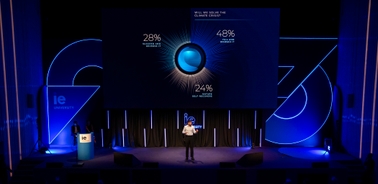- Home
- News And Events
- News
- The Next 50: Trends For The Next 50 Years
THE NEXT 50: TRENDS FOR THE NEXT 50 YEARS

In celebration of IE University's 50th Anniversary, the Center for the Governance of Change proudly unveiled its foresight report, "The Next 50: Trends for the Next 50 Years." This publication explores the future across various areas including technology, governance, education, and others, and has been shaped by the contribution of 15 experts and over 8,000 citizens.
Global economic inequality and climate change will be the main challenges humanity will face by 2073, according to the report developed by the Center for the Governance of Change (CGC), which delves into the next 50 years in the realms of technology, economic trends, scientific challenges, the environment, and the future of education.
Regarding the future of the economy, 39% of citizens believe in a brighter economic outlook for themselves and future generations, surpassing the number of citizens (25%) who anticipate a decline in their financial well-being.
- To prepare for potential economic challenges, most respondents opt for saving and investing money (27%) followed by improving skills and learning to use new technologies (24%).
- In Europe, countries including Spain (73%), Germany (68%), and France (63%) consider that our economy will be more unequal by 2073. A majority (55%) of Britons also believe wealth will be more unequally distributed.
- Indonesia (55%), China (47%), and India (45%) remain the most hopeful that the economy will be more equally distributed in the next 50 years.
The report looks at attitudes regarding technology and what it may look like in the future, including AI and the role of biotechnology in our lives. Overall, these tech developments are widely seen as having a large role to play in the future.
- Respondents place competition for natural resources and environmental concerns as the most relevant ethical challenge that technology will present in the next 50 years. Water conflicts due to drought are the climate risk that people deem most likely to occur.
- A vast majority of participants (80%) think AI will play a key role in our societies by 2073.
- Of these, almost half believe AI will become seamlessly integrated into daily life and one in three (33%) think AI will dominate all aspects of human existence.
- Almost half of the respondents (48%) believe that by 2073, healthcare will have personalised genetic treatments.
The report also reveals what citizens imagine education will look like in 50 years, from the future of the classroom to the way we teach.
- The most popular scenario foreseen by respondents is the rise of the use of AI in the classroom (47%), signaling a significant shift towards technology-driven learning, particularly in Asian countries: China (65%), Indonesia (63%), Japan (58%) and South Korea (58%).
- On the other hand, more European and Latin American countries predict a shift to experience-based learning outside of classrooms.
- A majority of citizens (62%) expect an individualization of education, where each student will have a tailored education. Asian countries lean more towards individualised education (73%) than European countries (53%).
- In contrast, 38% believe class-based learning will continue to be the norm.
The study also uncovers the potential existential risks citizens worry about:
- Presented with a list of various potential scenarios to occur in the next 50 years, the top three chosen by participants are a climate cataclysm, a pandemic, and a global system collapse (social chaos, economic collapse).
- In the event any of the scenarios presented were to occur, most respondents (48%) said they would try to counter the threat by mobilizing and collaborating with others. 40% would opt for a flight response and try to relocate to a safer region or seek refuge, and 11% said they would freeze and feel too overwhelmed to act decisively.
- There is a generational split between the young and the old. The percentage of respondents who think they are more likely to “fight” than “flight” tends to be higher among older rather than younger respondents.
To download the full report, please click here.